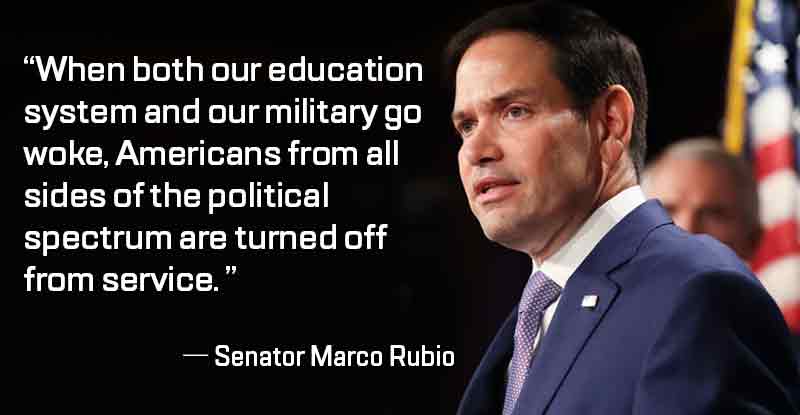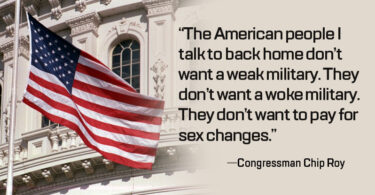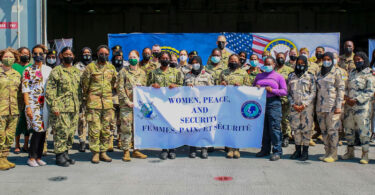“Is it really worth joining and putting our life on the line for ideologies that we don’t agree with and that we don’t want to necessarily protect?”—Recent High School Graduate
Congress should start de-politicizing the military by passing provisions to stop the Biden administration’s attempts to turn our military into a woke social experiment.
By Senator Marco Rubio
The Pentagon’s acting undersecretary for personnel recently testified to Congress, “The all-volunteer force faces one of its greatest challenges since [its] inception.”
If you’ve been following the news, it’s obvious what he was referring to. Since 2018, we have been bombarded with headlines on the record-low number of Americans joining the military.
These headlines reached a fever pitch two years ago when almost every branch of the U.S. armed forces missed its recruitment goals. The Army, in particular, fell short by a whopping 25 percent. Unfortunately, things were no better in 2023.
Collectively, the military branches undershot their annual goals by 41,000 recruits last year.
Meanwhile, the greatest fighting force in world history is beginning to decline.
“Navy ships are undermanned,” writes retired Lieutenant General Thomas Spoehr, “and the Army is considering cutting the number of its Brigade Combat Teams.”
This is as our nation enters a new era of multipolar geopolitics, with a chief adversary, Communist China, more powerful than the Soviet Union ever was; as savage terrorists have declared war on Israel and slaughtered more than thirty American citizens; as Iran and its proxy groups—Hamas, Hezbollah, Palestinian Islamic Jihad, the Houthis, and more—threaten to sow chaos across the entire Middle East and disrupt international shipping lanes; as we approach the second anniversary of Europe’s largest land war since World War II. The so-called “peace dividend” is not looking good for America.
If we want our nation to stay safe and strong, we need to increase military recruitment.
First and foremost, we need to wrestle with the reasons why Americans have stopped signing up to serve.
Admiral Mike Mullen reports that “moms and dads, uncles, coaches, and pastors don’t see [the armed forces] as a good choice” anymore. This obviously reduces recruitment because the vast majority of Americans who do sign up, including almost 90 percent of Air Force members, have close familial ties to the military. But why is this the case?
Mission Creep
On September 11, 2001, Islamic terrorists attacked the United States and killed 2,977 people. Over the next twelve months, 181,510 Americans enlisted for active duty, and another 72,908 enrolled in the reserves. There was a literal call to arms, and our people raised their hands to answer it as they always have.
But what started as a mission to destroy Al Qaeda, kill Osama bin Laden, and deny terrorists a safe haven quickly morphed into long-term campaigns to rebuild Afghanistan and Iraq, both accompanied by grueling counterinsurgencies.
Our volunteer warriors served dutifully in the Middle East. They and their families made great sacrifices, sometimes including the greatest sacrifice. By neutralizing terrorist networks, they made a real difference, just as Israel’s defenders are making a real difference by eradicating the threat of Hamas.
Unfortunately, America’s nation-building efforts were less successful.
The Taliban once again controls Afghanistan. Things are only marginally better in Iraq, where our military is ignored, unappreciated, and subject to attacks by Iran-backed Shia militias.
The impact on our national morale has inevitably been negative.
“It was frustrating to see all that work unravel,” remarks Medal of Honor awardee Florent Groberg on the U.S. withdrawal from Afghanistan.
Reflecting on the loss of government control in Iraq, veteran Tim Baker ponders: “You spend a year or two of your life over there. You sweat, you bleed, you cry, and what was it all for?”
These feelings aren’t restricted to service members.
Earlier this year, a poll found that 61 percent of citizens believed the Iraq War was a mistake. We need to acknowledge this reality if we are to rebuild our military and re-establish trust with the American people.
After all, about half of the active-duty armed forces and about one-third of the reserves are less than twenty-five years old. This means the majority of people serving and considering service have no detailed memories of 9/11.
They may see the military operations that transpired in the decades since as ambiguous at best and foolhardy at worst.
It is not a legacy we can ignore or whitewash.
Failed Promises
Perhaps an even greater issue is the fact that many Americans now see signing up to serve as signing up for a decreased quality of life. This is the most prominent theme in all the reporting on the military recruitment crisis.
We’ve been here before. Many Americans resented being drafted for the Vietnam War, and they resented their experiences during the conflict.
The years that followed saw a recruitment crisis similar to that of today, prompting President Richard Nixon to declare that the “benefit and worth of a military career must be more effectively communicated to the American people.”
To get things back on track, our leaders sought to make service more professionally, financially, and personally rewarding.
By the early 1980s, they had succeeded. President Ronald Reagan presided over the restoration of America’s fighting force to its necessary strength. Recruitment was generally satisfactory over the course of the next few decades.
After 9/11, however, the conditions of service changed.
To fight two wars on the far side of the globe, troops deployed at unsustainable rates far exceeding the post-Vietnam Gates Commission guidelines. Many were recalled from retirement or kept on duty as recruitment declined.
And what they received in return was pitiful: moldy housing, below-poverty line pay, and prolonged exposure to life-altering toxins.
Returning home was hardly an improvement. Veterans struggled to compete in the United States’ increasingly white-collar, service-oriented workforce, which prioritized college degrees above all else.
Meanwhile, the U.S. Department of Veterans Affairs (VA) mistreated the very people it exists to care for. It even denied healthcare liability for conditions the U.S. government created.
From 2001 to 2022, the VA rejected more than 300,000 veterans seeking treatment for illnesses resulting from exposure to burn pits, a common feature of U.S. bases in Iraq and Afghanistan.
Until the passage of the bipartisan Honoring Our PACT Act, unelected bureaucrats could demand that veterans prove the connection between their exposure and their disease—often an impossible task—just to avoid the hassle and cost of giving them the benefits they earned.
These factors combined make the military an unattractive career choice.
How many high school graduates would willingly risk years of neglect at the hands of the U.S. government when they could earn a competitive wage and build their resumes at the local Starbucks?
How many parents would encourage their children to take such a risk?
The answer, it seems, is fewer and fewer every year.
A Radical Turn
Meanwhile, we’ve seen a dramatic fall in patriotism.
Only 39 percent of citizens are extremely proud to be American, twelve points down from 2017.
Worse, just 18 percent of citizens between eighteen and thirty-four, the prime demographic for military service, are extremely proud to be American. That number falls to 12 percent for Democrats.
This makes sense when you consider that the political Left, the corporate media, many public schools, and the vast majority of colleges have spent the past six years peddling the narrative that the United States is an irredeemably oppressive and racist nation.
But while no one should be surprised, everyone should be concerned.
When both our education system and our military go woke, Americans from all sides of the political spectrum are turned off from service.
Wokeness tells progressives that their country is evil and not worth defending.
It tells conservatives that their leaders and public institutions do not share their values.
It distracts everyone from one of the military’s greatest gifts, which is the chance to be part of a cause greater than one’s self, to feel the camaraderie that only comes from working as a community to achieve a common goal––in this case, the protection and defense of the greatest country that has ever existed.
A perfect example of wokeness’s detrimental effects is the COVID-19 vaccine mandate for service members.
Passions were high on both sides during the early days of the pandemic, but looking back, the Pentagon’s decision to discharge roughly 8,400 men and women in uniform—the vast majority of whom were at minimal risk from the virus—reeks of vindictive, partisan fanaticism.
How could such fanaticism not deter younger members of our society from signing up?
Consider the words of one recent high school graduate: “Is it really worth joining and putting our life on the line for ideologies that we don’t agree with and that we don’t want to necessarily protect?”
They express a sentiment that is more common among would-be recruits than many realize.
For an individual, this doubt and others like it are understandable and perhaps even justified. But for the United States, they are a big problem.
Turning things around will be a long and difficult process, and the sooner we get started, the better.
Righting the Ship
As policymakers, our response to the military recruitment crisis should be threefold. First, we must take better care of active-duty service members and veterans to rebuild people’s trust that if they sign up, they will be taken care of by their government. To this end, Congress has already made some real progress.
My Department of Veterans Affairs Accountability and Whistleblower Protection Act empowered the VA secretary to fire bad employees and established legal protections for VA whistleblowers fearing retaliation.
Meanwhile, the bipartisan Honoring Our PACT Act, based on legislation I introduced in 2021, forced the VA to care for those suffering from exposure to burn pits in the line of duty.
We also passed legislation to help the one million veterans and civilians exposed to contaminated drinking water at Camp Lejeune, North Carolina.
But enacting laws is one thing—enforcing them is another.
The Biden administration continues to erode the protections established by Congress’s reforms, and the Navy continues to slow-walk claims made by Camp Lejeune veterans, families, and civilians.
In essence, our leaders are putting the job security of government bureaucrats over the health of wounded Americans. Congress needs to pass more legislation to force continued change.
Furthermore, for many veterans, reforms like the PACT Act came far too late. The delay did untold damage to them, their families, and our military.
We cannot turn a blind eye to these issues moving forward.
Tackling poor base housing, inadequate childcare options, and sub-par enlistee pay head-on should be a priority.
Enhancing the career prospects of those returning to civilian life––for example, by expanding science and technology education for service members and their families––is also critical.
The second requirement for policymakers is to keep woke politics out of the armed forces.
These institutions exist to stand united against common enemies.
Tying them to divisive cultural flashpoints would be a bad idea in the best of times—at this precarious moment, it is downright dangerous.
If progressives cannot bring themselves to put the common good above the good of their party and its interest groups, they must rethink their calling to public service.
Congress should start de-politicizing the military by passing provisions to stop the Biden administration’s attempts to turn our military into a woke social experiment.
Some such provisions were included in this year’s National Defense Authorization Act, including a hiring freeze and salary cap on “Diversity, Equity, and Inclusion” bureaucrats at the Pentagon. (Unfortunately, others were removed by Democrats from the version of the bill that became law.)








Leave a Comment